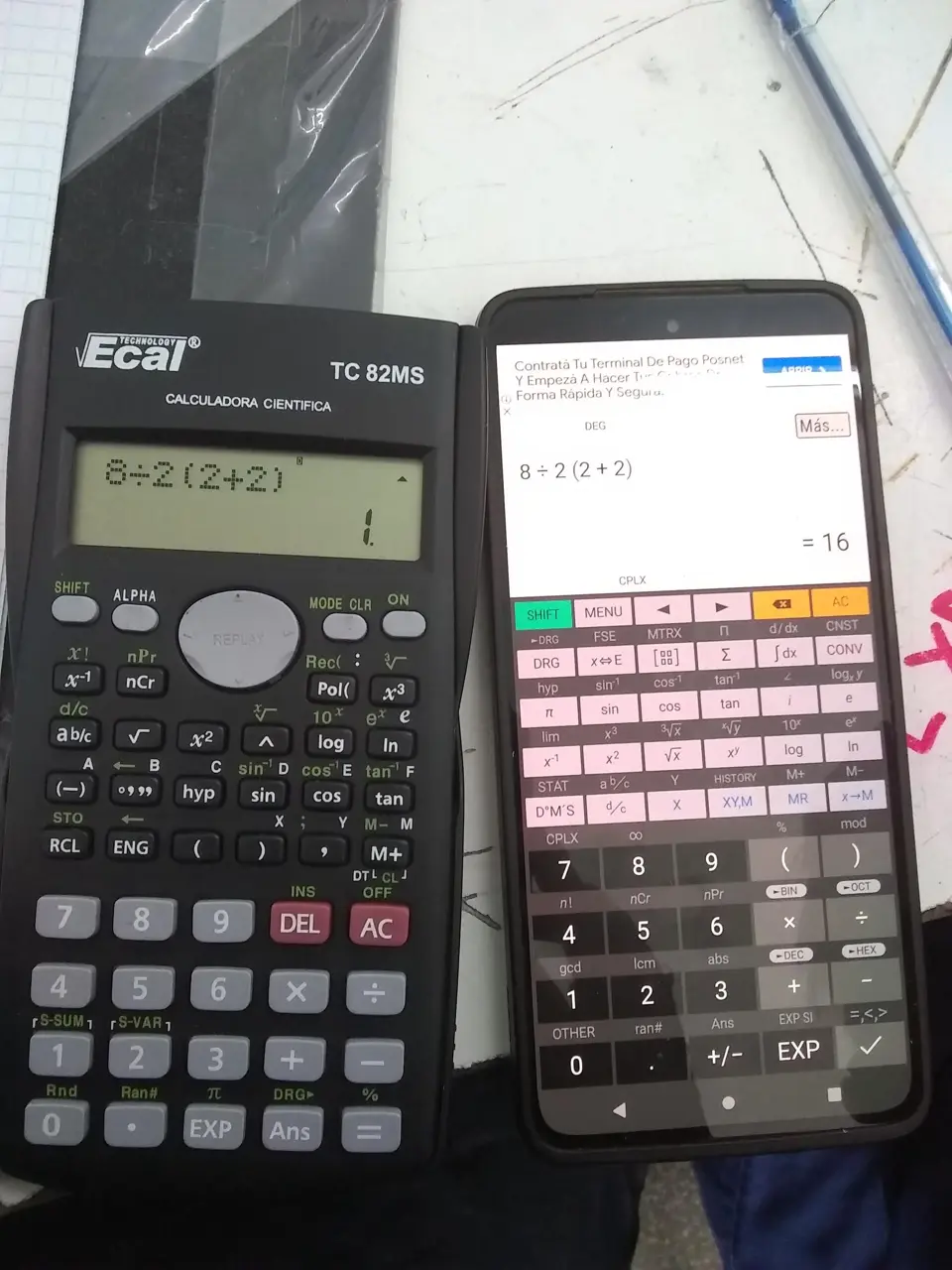this post was submitted on 03 Dec 2023
407 points (99.5% liked)
196
16815 readers
831 users here now
Be sure to follow the rule before you head out.
Rule: You must post before you leave.
founded 2 years ago
MODERATORS
you are viewing a single comment's thread
view the rest of the comments
view the rest of the comments

Correct, you're reading 2x as one variable, and you're not reading 2(2+2) as one variable. That is the proper way of reading it. 2(2+2) is not one variable, and should not be read as such; it is a sequence of operations, and should be read with that in mind.
The answer is not 1 per any correct rules of mathematical calculation. If your calculator is giving you 1, you have a bad calculator that is incapable of performing this kind of operation.
OK, you're just ignoring me, and the wealth of evidence I've provided that contradicts what you're saying. Goodbye.
You've given no evidence, you've given bullheaded insistence on an incorrect answer.
Check the links in my previous comment, look it up on Wikipedia. The jury is very much out. You're the one being bullheaded here.
The last link is well worth a read.
No, the jury is not out, you're attempting to read from common convention regarding variables an order of operation that doesn't exist.
Dude you really are being stubborn. You clearly haven't studied maths beyond grade school level.
In academia, even in America, either implicit multiplication is considered first before explicit multiplication and division, or, as per the American Physical Society, multiplication always comes first.
If you'd read even just the wikipedia article you would have realised this.
You're taking what you were taught in school as if it were gospel. Do yourself a favour and fact check. What they teach in school is often simplified so that more people can understand the basics.
In no level of mathematics is a calculation written as above correctly solved as 1. You're attempting to extrapolate from the natural reading of variable handling a mythical order of operations that applies in every instance. This is false.
Multiplication and division are essentially the same operation expressed differently, and they occur at the same level of priority. The only reason we evaluate things like 2x before other multiplication or division operations to the left is because the natural reading of variable components like this makes sense, and we implicitly treat it as (2x).
There is no separation of multiplication types in the order of operations.
According to the American Mathematical Society and the American Physics Society, the answer is absolutely 1.
I'm not making any extrapolation here, I'm following practices that have been standard for far longer than the PEDMAS acronym - which you are attempting to retroactively apply.
Implicit multiplication, or juxtaposition, comes before division and explicit multiplication. It's just harder to teach kids that when they're starting out - they keep it to a simple acronym. But that's the way it goes, like I say, you wouldn't split 2x across the denominator in exactly the same way you wouldn't split 2(2+2).
Juxtaposition only makes sense in this fashion when you're using variables because of the way they're read. It would absolutely be incorrect to attempt to use this kind of reasoning in a simple equation like the above, with no variables which need resolving. 2x is read as a single entity; 2(2+2) absolutely isn't, and it is incorrect to treat it as such.
It absolutely is correct, you were taught wrong.
No it isn't, you're desperately trying to compensate for incorrectly reading a simple equation by applying variable-specific standards to simple numerical questions.
Lmao you're the desperate one here. I've got evidence backing it up, you have a "rule" a teacher taught you in grade school.
Next thing you'll be telling me "i before e, except after c".
No, you have a misunderstanding of the application of rules regarding variables, which you're trying to apply to simple equations as if there were an order of operations inserted in there. This equation inserted into virtually any calculator program of any sufficient complexity confirms the correct answer as 16. The fact is you, like many people, misread it, got the wrong answer (1), and are trying to cover your embarrassment by grasping at straws to justify your incorrect position.
It's transparent and tedious, and I'm done bothering with you.
You're right, it's incredibly tedious. I've explained exactly how and why you're not right, and even given you the middle ground by saying "it's debated". Yet you still cling to the misconception that you are right, and I am wrong.
Nevermind that we're supposed to be arguing an idea here. Nevermind that I've provided sources that went all the way back into maths history to figure out exactly how things were always done. You have to be right, and you just cannot accept any reality where you're even slightly wrong.
Insert it into an American calculator, sure. I refer back to my (half-joking) comment about Americans butchering terminology.
If you check my comment history, you'll see that my 1st or 2nd comment in this thread was me trying this in my own Casio calculator. As written, I get 1, then with explicit multiplication I get 16. Everything I've said here has been an evolution of my understanding of this weird (i before e...) quirk - which is in fact the very purpose of this meme.
Have a good one, and I genuinely hope you're more open minded in your day to day life, for your own benefit.